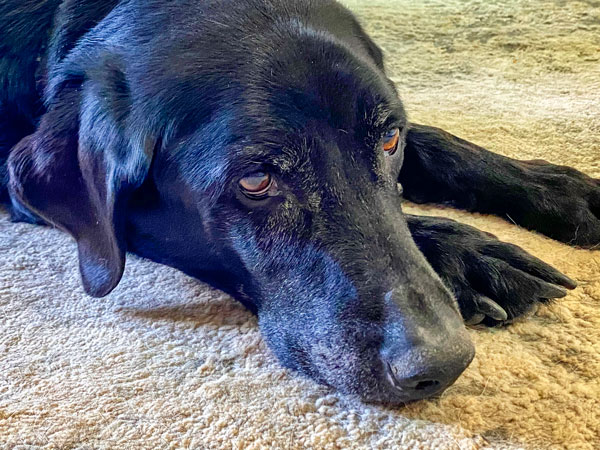Getting older: senior pets
Article and photo by Kathy Fallert

November is National Senior Pet Month. Regular readers of this column know my three dogs, 2-year-old Otis, 9-year-old Tebow and my senior Sadie who is 12. I understand very well the different needs of an aging pet. Sadie has always been a hard-core athlete. Her stamina could outlast the most devoted retriever, and she’s always been much more interested in playing ball than cuddling. If you are holding a ball and not throwing it, Sadie would bark, bark and bark some more until you see fit to play fetch.
Over the past year things have shifted for Sadie. She still loves a good game of fetch; however, she’s more inclined to watch Tebow do the fetching. She opts not to bark much at all these days, and sometimes just stands staring at a wall. Sadie is aging. Her face is getting gray, her endurance has declined and she seems to forget why she walked into a room. I know the feeling!
There are ways to help older pets have a high quality of life. Assessing if an animal is reaching the age where extra support is needed is important. Natural health decline happens at different ages for different pets, so consider the size and breed of your pet when evaluating. Four physical signs of aging in cats and dogs are graying eyes and muzzle, stiffness in movement, lack of endurance and overall decreased flexibility of tissues. In addition, cognitive function begins to decline in the later years such as forgetfulness, inappropriate vocalization, difficulty sleeping, increased anxiety, hearing loss and even disorientation.
As with humans, supplements can help an older pet have a better quality of life. According to the American Kennel Club website, “Many of the supplements we consider taking for ourselves as we age can also be beneficial for our older dogs, although it’s important to consult with your veterinarian before adding any supplements to your dog’s diet. For example, glucosamine and chondroitin may protect cartilage in the joints. Antioxidants [such as Vitamins C and E] are another potentially important supplement that can improve memory and cognitive function in senior dogs.”
You can also look for quality commercial food geared to senior dogs that already contains supplements. Most importantly, keeping old pets engaged and involved with life will exercise their brain and help preserve cognitive function.
